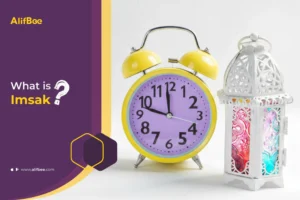
What Is Imsak? Learn A Key Islamic Word for Fasting in Ramadan
What is Imsak? Understand the time of Imsak before Fajr Adhan. Learn the difference between Imsak and Fajr time in Islam for the month of Ramadan and your fast.
In a previous blog, we learned How to Say Goodbye in Arabic, but what if you want to sound more natural and say see you later instead?
In this article, we’ll mainly focus on phrases meaning See You Later in Arabic, not just general goodbyes. These phrases could be used with your colleagues at university or at work, or with anyone you meet regularly.
Goodbye phrases are essential because we want to part with people on a good note and leave a good impression that fosters our relationships. Arabic vocabulary possesses a wide range of phrases for all types of situations, like casual and formal settings. Therefore, today we will discover more goodbye phrases that carry with them the promise of meeting again. They are used both in Modern Standard Arabic and in Arabic dialects, so you always have the right expression for the right moment.
As we go through these Arabic goodbye phrases, we will introduce you to the proper context and the nuances between similar expressions. This is important because when you use the right expression, you show respect through proper social etiquette. Your conversations will therefore sound more meaningful and polite if you ever travel to an Arabic-speaking country.
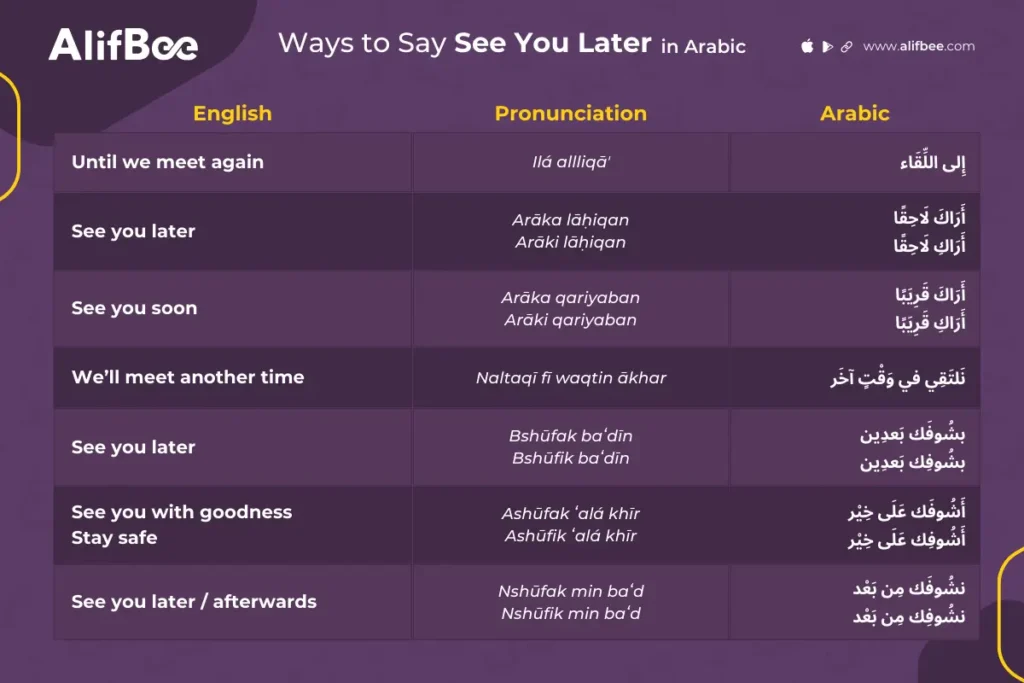
Let’s look at a short conversation people use when they meet someone new and then say goodbye politely.
English Meaning
Pronunciation
Arabic
Until we meet again
Ilá allliqāʼ
إِلى اللِّقَاء
A: I was pleased to meet you.
A: Surirtu bi-taʿaruf ʿalayk.
A: سُرِرتُ بالتعرّف عليك
B: Me too.
B: Wa-anā ayḍan.
B: وأنا أيضًا.
A: Until we meet again.
A: Ilá al-liqāʼ.
A: إِلى اللِّقَاء.
This phrase literally means “to the meeting.” It is a concise phrase using a preposition and the verbal noun لِقَاء which means meeting.
Unlike the English “goodbye,” this phrase highlights the idea of meeting again.
This formal and polite farewell is very common in Modern Standard Arabic. It’s often used in speeches, writing, or news broadcasts rather than daily conversations. Using إِلى اللِّقَاء adds warmth and sophistication, showing the cultural value placed on future connection.
Let’s look at this example between two friends after a day out:
English Meaning
Pronunciation
Arabic
See you later (M)
Arāka lāḥiqan
أَرَاكَ لَاحِقًا
See you later (F)
Arāki lāḥiqan
أَرَاكِ لَاحِقًا
A: It was a fun day, but I have to go now.
A: Kāna yawman mumtiʿan, lakin ʿalayya al-dhahāb al-ān.
A: كان يومًا ممتعًا، لكن عليّ الذهاب الآن
B: See you later!
B: Arāka lāḥiqan!
B: أراكَ لاحقًا!
This phrase literally means “to the meeting.” It is a concise phrase using a preposition and the verbal noun لِقَاء which means meeting.
Unlike the English “goodbye,” this phrase highlights the idea of meeting again.
This formal and polite farewell is very common in Modern Standard Arabic. It’s often used in speeches, writing, or news broadcasts rather than daily conversations. Using إِلى اللِّقَاء adds warmth and sophistication, showing the cultural value placed on future connection.
Here we have a short everyday dialogue you can use when telling someone you’re going out, and they reply politely.
English Meaning
Pronunciation
Arabic
See you soon (M)
Arāka qariyaban
أَرَاكَ قَرِيَبًا
See you soon (F)
Arāki qariyaban
أَرَاكِ قَرِيَبًا
A: I’m going to the market now.
A: Sa’adhhab al-ān ilā al-sūq.
A: سأذهب الآن إلى السوق
B: Okay, see you soon.
B: Ḥasanan, arāka qarīban.
B: حسنًا، أراك قريبًا.
The first part is the same as the previous phrase, but with a slight difference in the second word قَرِيبًا (qarīban), which means “soon, nearby in time.” This shows the Arabic preference for adverbs as standalone indicators of time.
The phrase literally translates to “I will see you soon,” which is like what we say in English, “See you soon.”
It’s polite, warm, and more common in MSA or semi-formal Arabic than in daily dialects. The phrase implies hope or expectation of meeting again in the near future.
Let’s see this example of two friends rescheduling a meeting:
English Meaning
Pronunciation
Arabic
We’ll meet another time
Naltaqī fī waqtin ākhar
نَلتَقِي في وَقْتٍ آخَر
A: Sorry, I can’t stay today.
A: ʾĀsif, lā astaṭīʿ al-baqāʾ al-yawm.
A: آسف، لا أستطيع البقاء اليوم.
B: No problem, we’ll meet another time.
B: Lā baʾs, naltaqī fī waqtin ākhar
B: لا بأس، نلتقي في وقتٍ آخر.
This phrase is built from نلتقي naltaqī (we meet) in the present tense, combined with في وقت آخر fī waqtin ākhar (at another time). It highlights Arabic’s frequent use of verbal sentences to express future events.
It’s polite but a little vague since it does not specify an exact time. It’s suitable for formal or semi-formal contexts, such as after a meeting or class. You can use it with both males and females without any changes.
As we saw earlier, Modern Standard Arabic (MSA) gives us elegant phrases like إلى اللقاء (Ilā al-liqāʾ) or أراك لاحقًا (Arāka lāḥiqan). However, everyday conversations usually sound much more relaxed. In informal settings, Arabs often switch to dialects, using expressions that feel warmer and more natural. Let’s look into these phrases that are common among friends, family, and colleagues.
Let’s see the following example of two friends parting after lunch:
English Meaning
Pronunciation
Arabic
See you later (M)
Bshūfak baʻdīn
بشُوفَك بَعدِين
See you later (F)
Bshūfik baʻdīn
بشُوفِك بَعدِين
A: I have to go now.
A: Lāzim rūḥ hallaʾ
A: لازم روح هلَّأ
B: See you later.
B: Bshūfak baʻdīn!
B: بشوفَك بَعدِين
This is a very casual, everyday farewell in Levantine Arabic (used in Syria, Lebanon, Jordan, and Palestine), equivalent to the English expression “Catch you later.” It is commonly used among friends, colleagues, and peers when you expect to see the person again but do not specify an exact time. When addressing a female, the phrase changes slightly to بشُوفِك بَعدِين (Bshūfik baʻdīn) to match the gender.
The phrase comes from the verb شوف (shūf) – “see,” plus the pronoun ك “you” and بعدِين “later”.
In the following table, we have two friends saying goodbye after a meeting:
English Meaning
Pronunciation
Arabic
See you with goodness / Stay safe (M)
Ashūfak ʻalá khīr
أَشُوفَك عَلَى خِيْر
(F)
Ashūfik ʻalá khīr
أَشُوفِك عَلَى خِيْر
A: Thanks for everything.
A: Shukran ʻala kull shay’
A: شكراً على كل شيء
B: See you with goodness! OR (stay safe)
B: Ashūfak ʻalá khīr!
B: أَشُوفَك عَلَى خِيْر
This phrase is widely used in many Arabic dialects, especially in the Levant, Egypt, and the Gulf. It conveys good wishes for safety and well-being, along with saying goodbye. It literally means “See you with goodness” or “Stay safe.” The phrase is slightly politer and warmer than casual goodbyes like بشوفَك بَعدِين, making it suitable for friends, colleagues, or acquaintances. And when addressing a female, the phrase changes to أشُوفِك عَلَى خِيْر (Ashūfik ʻalá khīr).
The phrase comes from the verb شوف (shūf) – “see,” and the pronoun ك “you” and على خِيْر “with goodness”, expressing both goodbye and good wishes in one expression.
Let’s look at the following example: two people in a family setting:
English Meaning
Pronunciation
Arabic
See you later / afterwards (M)
Nshūfak min baʻd
نشُوفَك مِن بَعْد
See you later / afterwards (F)
Nshūfik min baʻd
نشُوفِك مِن بَعْد
A: I’m going home.
A: Raḥ rūḥ ʻal-bēt.
A: رح روح عالبيت
B: See you later!
B: Nshūfik min baʻd!
B: نشُوفِك مِن بَعْد
This one is a colloquial farewell used in casual contexts among friends or family, meaning “See you later” or “See you afterwards.”
It carries a sense of community through the plural “we” in نشوف (nshūf – “we see”), which is a common feature of politeness in Levantine and other dialects. This phrase is mostly used in Moroccan Arabic.
And like what we saw in previous phrases, the form changes when addressing a female. It becomes نشُوفِك مِن بَعْد (Nshūfik min baʻd).
How to choose the right expression? First, consider the context and region. If you are in formal settings, meetings, or classes, opt for إلى اللقاء (ilā al-liqāʾ) or أراك لاحقًا (arāk lāḥiqan). These are safe choices in formal situations.
But when with friends and family, dialect expressions such as بشوفك بعدين (bshūfak baʻdīn) in Levantine or نشوفك من بعد (nshūfak min baʻd) in Moroccan Arabic feel much more natural. Since MSA can sound stiff in casual talk, sticking to the local dialect helps you connect smoothly with native speakers.
Arabic is full of beautiful ways to say see you later both in MSA and regional dialects. Formal expressions in professional or polite settings and informal expressions with your friends will help you grow confident and natural in your journey of learning Arabic.
To keep improving your Arabic, we invite you to download our AlifBee, an App that has helpful lessons and exercises. It will help you broaden your knowledge of Arabic and become more fluent and confident in using the language.
Author
Diala is an experienced language educator and writer passionate about making Arabic learning simple and engaging. At AlifBee, she crafts educational content that connects English and Arabic learners through clarity and creativity.


Achieve incredible results with our platform Learn Arabic Online with AlifBee

Join AlifBee Virtual School and master Arabic at your pace — from guided coaching to interactive self-learning.

Learn Arabic faster with live, one-on-one sessions tailored to your level and goals.

Explore AlifBee’s complete range of Arabic learning books for all ages!

What is Imsak? Understand the time of Imsak before Fajr Adhan. Learn the difference between Imsak and Fajr time in Islam for the month of Ramadan and your fast.
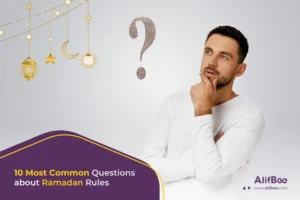
What time can you eat during Ramadan? Can you drink water, brush your teeth, or smoke? Clear answers to the most common Ramadan rules.
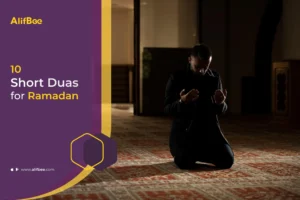
Short Duas for Ramadan in Arabic and English. Learn short supplications in Arabic and English to connect with Allah (SWT) this holy month. Download Free Daily Dua PDF
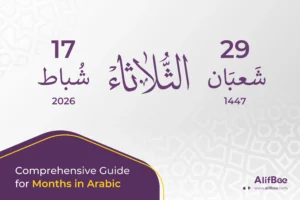
Learn how to say months in Arabic with clear tables, pronunciation tips, and explanations of Gregorian and Hijri calendars for learners.